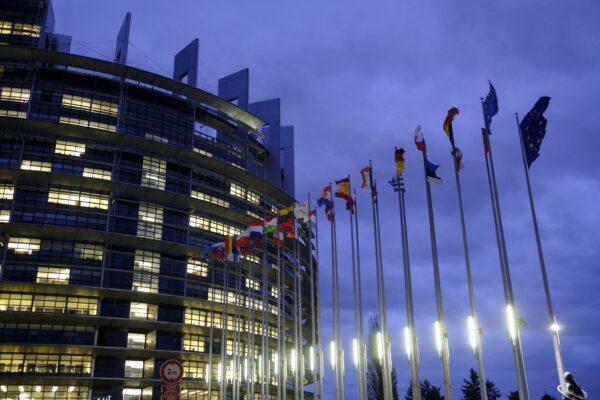Large French companies lobby against European plan to limit greenhouse gas emissions
Trade body representing Total, L’Oreal and Michelin lobbies against including greenhouse gases in industrial pollution regulation

The trade body representing large French companies such as Total, L’Oreal and Michelin has been lobbying against a European Commission plan to reduce greenhouse gas emissions, Unearthed can reveal.
Documents submitted to the Commission show that the Association of Large French Companies (AFEP) lobbied against the inclusion of greenhouse gases in the Industrial Emissions Directive (IED).
The IED is used to regulate pollution from around 50,000 industrial installations in Europe. It takes into account various different types of pollution but does not include greenhouse gases.
It is currently under review and the European Commission has proposed adding greenhouse gases to its remit. This would require governments within the EU to set limits on greenhouse gas emissions from industrial sources.
In September, the Commission is expected to publish an updated proposal, taking into account the consultation responses received from organisations including AFEP.
The proposal forms part of the European Green Deal, a set of policy initiatives aimed at making Europe climate neutral by 2050.
According to the European Environment Agency, resource and energy-intensive industries such as steel, cement and chemicals currently emit 19% of Europe’s total greenhouse gas emissions.
The IED is not appropriate to a global phenomenon such as global warming
In its response to the consultation on the review of the directive – seen by Unearthed – AFEP argued that the EU’s Emissions Trading System (ETS) already sufficiently regulates greenhouse gas emissions.
It added: “The IED is a tool dedicated to local pollutants. It is not appropriate to a global phenomenon such as global warming. The IED should therefore not overlap with other EU legislation, such as the EU ETS.”
When contacted by Unearthed, François Soulmagnon, director general of AFEP, defended the group’s position, arguing that it was important to keep regulation of greenhouse gas emissions separate from regulation of local pollutants.
He said AFEP supports the European Green Deal, adding: “AFEP identifies how to best reach [the net zero] target while keeping the specificities of each EU legislative tool which is dedicated to a specific environmental objective.”

Damien Carême, a French Green member of the European Parliament, told Unearthed he agreed with the European Commission’s proposal to add greenhouse gases to the directive.
He added: “Some wrongly believe that the directive should not include a limit on greenhouse gas emissions, on the grounds that the carbon market already plays this role. In fact, they complement each other!”
He pointed out that the price of carbon in the EU ETS is only €20 and argued that binding legislation through the Industrial Emissions Directive is also needed.
‘The voice of large French companies’
AFEP represents 113 of the largest private companies in France, many of which would be affected by the expansion of the IED. Apart from Total, L’Oreal and Michelin, these companies also include Airbus, Air France, Renault, Carrefour and the French branches of HSBC, Siemens and IBM.
On AFEP’s website it calls itself “the voice of large French companies”.
These companies have all trumpeted their own climate ambitions on their websites. Unearthed asked for their views on AFEP’s lobbying efforts.
- Spokespeople for Michelin and Total declined to comment, while Renault, Carrefour, Siemens and IBM failed to respond.
- A spokesperson for Airbus said the company “supports the objectives of the EU Green Deal regarding the reduction of emissions”. They said they didn’t want to comment on the specifics of the AFEP lobbying but added that Airbus often represented itself at the European Commission.
- An HSBC spokesperson said: “HSBC France is a member of AFEP, but we have not been involved with this consultation with the European Commission.”
- A spokesperson for Air France defended AFEP’s position, saying the EU ETS should regulate global warming, not the IED.
The Emissions Trading System currently regulates greenhouse gas emissions in the EU. It is a market-based ‘cap and trade’ system, meaning it puts a limit on the total amount of greenhouse gases that installations can emit.
The EU ETS was introduced by free-market-rules-all maniacs
The system allocates companies ‘emissions allowances’. They can trade these with each other or buy more.
Christian Schaible, policy manager for industrial production at the European Environmental Bureau, told Unearthed that it was the Emissions Trading System that took greenhouse gases out of industrial regulation in the first place.
He said it was introduced by “free-market-rules-all maniacs” who removed greenhouse gases from the equivalent of the Industrial Emissions Directive in 2003 and allowed energy efficiency requirements to be optional.
As a result, governments have generally not included any requirements for energy efficiency in the permits they issue under the directive.
Schaible added: “The best way in terms of technique is just not to have CO2 emissions [so taking the right fuel choice], full stop. You do this as a minimum. We want the combined approach. We want the greenhouse gas trading system to be improved plus, of course, the [IED] to rule out certain ways of producing which are too greenhouse gas-intensive.”

